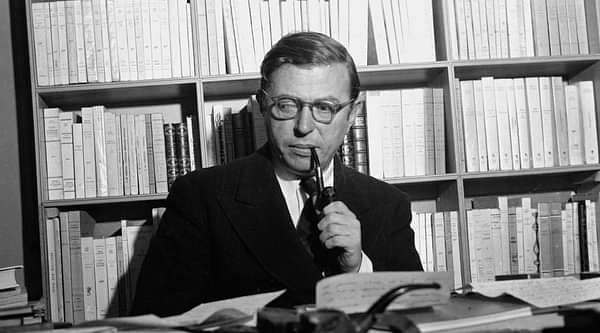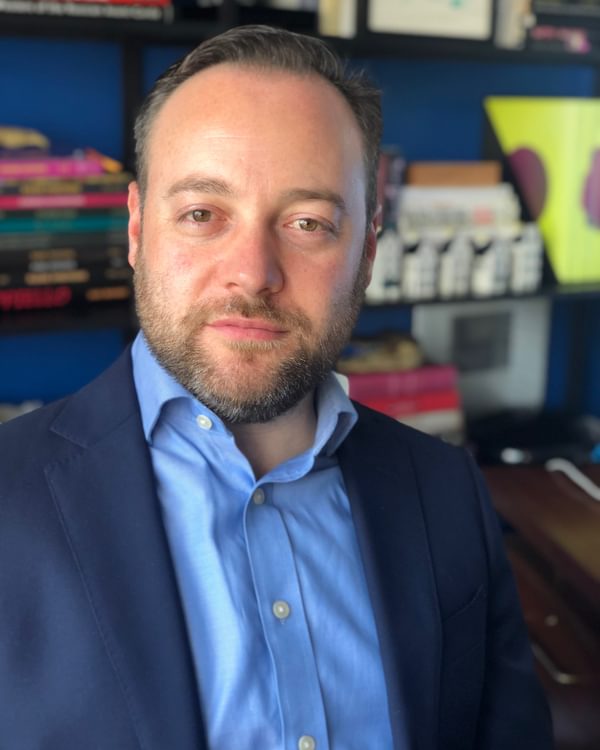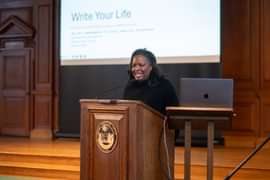
August 07, 2020
Social distancing with Jean-Paul Sartre
If hell is other people, isolation is no paradise. Alumnus considers philosopher's famous maxim.by Charles Landow ’99
Social distancing seems the ultimate validation of Jean-Paul Sartre’s famous maxim: L’enfer, c’est les autres. Hell is other people.
We know that we catch many diseases, from the common cold to Ebola through various forms of human contact. But we have never been pushed—by the government megaphone and even the force of law—physically away from each other.
You may be my spouse, my friend, my grocery store clerk. You are also a vector of disease. And the COVID-19 pandemic has lodged that sentiment more firmly in our minds than ever before.
Sartre’s line comes from a play entitled Huis Clos, published in English as No Exit. In fact, the title means something like “behind closed doors,” exactly where so many of us have been this year.
The play takes place among three deceased people in a single room. Their conversation leads them to realize that they are, themselves, the instruments of each other’s eternal torture. They are each other’s hell.
 Jean-Paul Sartre
Jean-Paul Sartre
Many people would say they have experienced something similar as they have navigated months holed up with spouses, children, relatives, and roommates. In most cases, this sense of torture is lighthearted. In others—for instance, people tragically confined with their abusers—it is far graver.
Those of us living alone, especially if we are lucky enough to have a livelihood we can sustain, have enjoyed maximum freedom. Yet this freedom is no substitute for human contact.
If hell is other people, isolation is no paradise.
In 1965, some two decades after writing Huis Clos, Sartre explained that the line about hell had been misunderstood. He was not saying that all human relationships are hellish. He was emphasizing instead how much we all depend on the views of others. As he put it, in my own translation, “When we think about ourselves, when we try to know ourselves, deep down we use the knowledge that others already have about us. Whatever I say about myself, the judgment of other people always enters into it.”
And because of this, Sartre suggested, “If relations with other people are warped, tainted,” then those people “can only be hell.”
So, the line from Huis Clos does not, according to its author, mean that good relationships are impossible. “It simply marks the major importance of all others for each one of us,” Sartre said.
Social distancing has shown that we can, at tremendous cost, minimize our exposure to our fellow humans. But if Sartre is right, we cannot escape their opinions.
Indeed, we need less actual contact than ever to judge and even torture one another. We have social media for that. And one consequence of isolation has been to drive more of our lives online. Sheltered as much as possible in our homes, we are hardly sheltered from what others have to say.
”Therefore, isolation has not really stolen human contact from most of us. It has, though, stolen much of what makes that contact such a joy: the physicality, the spontaneity, the sensation of moving together through the world. In so doing, social distancing has taken our most effective, or at least our most fun, ways of learning about our environment, our fellow humans, and ourselves.
Many of us have been thinking about how the world might change when we emerge from the depths of this pandemic. We might fly less; we might sanitize more.
I think mostly about the people I value in my life. I think about the conversations we will have when we can hug, share a dinner table, and look each other in the eye. And, channeling Sartre, I think about what those people have taught me about myself—and how much I still have to learn.
Near the end of Huis Clos, Garcin, one of the condemned trio, finds that the door to their infernal chamber is actually unlocked. Even when he opens it, though, none of them leaves.
Most of us, I hope, will walk through our own doors freely again soon.
As we do, we will still be subject to the judgment of others. Our self-conception will still build on the way people see us. We will still be vulnerable, most of us, to a negative review, a withering look, or the pressure we feel to meet society’s definition of success. We will still struggle to know which opinions to accept and which to filter out. We will still strive to take account of the world’s judgments without losing a sense of ourselves.
But we will be able to navigate all that together, in person and not on a screen. That hardly seems like hell.

Charles Landow is a public policy research director in New York and an adjunct instructor of political science at the University of Nebraska, Omaha.
Categories: Alumni
Other Stories

Best-selling author Rachel Howzell Hall delivers MLK Day keynote



